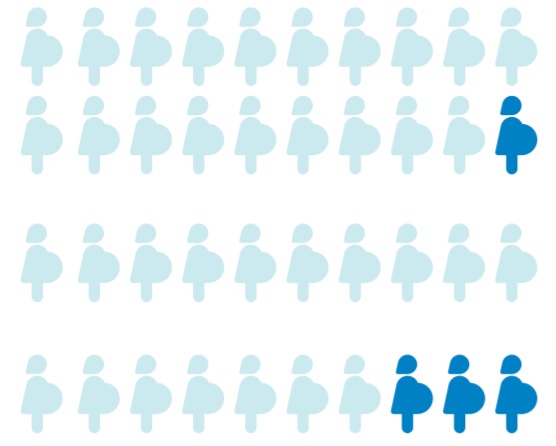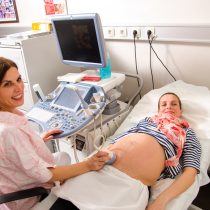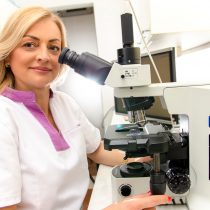Should I really do it, it’s a question that most pregnant women are faced with when time for prenatal testing comes, and especially those ones who got pregnant by in vitro fertilisation. Can an invasive method (amniocentesis) be harmful to their baby, pregnancy, will it hurt, what will the results be like, will everything be all right, these are all questions which arise and upset you.
It’s a good news that you can relax! NACE testing is an excellent, non-invasive alternative, and much more suitable for many issues.
 Why should I do NACE non-invasive prenatal testing
Why should I do NACE non-invasive prenatal testing
You can do it as early as the tenth week of pregnancy, it is a fairly simple and common procedure of prental screening from a sample of mother’s blood, and exhaustive results are obtained in only 6 days. Only 9 ml of blood will be enough to precisely determine chromosome changes and the sex of the baby, while bearing absolutely no risk, neither for the baby nor mother.
During pregnancy, baby’s DNA circulates through mother’s blood. By means of new-generation technologies, a method of sequentioning and advanced bioinformatic analysis NACE test reveals free DNA and offers a lot of valuable information.
Most referenced European genetic laboratory “Igenomix” from Spain has chosen Specialized gynecological hospital “Genesis“ to be the first one in the territory of southeastern Europe to introduce those most contemporary genetic tests and methods.
Why biochemical screening is not enough
Plain biochemical screening (Double, Triple test) often can provide a false feeling of security, because out of 20 women who carry a baby with Down syndrome, 3 will have a negative test result on biochemical screening.
This type of testing can, at the same time, cause unnecessary worry, because out of 20 women with positive result for Down syndrome screening, only one will carry a baby with Down syndrome.
NACE testing will protect you from this uncertainty, too.
 If I do NACE testing, what other tests I don’t have to do
If I do NACE testing, what other tests I don’t have to do
NACE testing is an excellent alternative for several screening methods, which significantly saves both time and money, and above all, releases you from unnecessary stress that these investigations bring along.
Screening in the first trimester, combination of hormonal and ultrasound analyses which take mother’s age into consideration and which is performed between the 9th and the 13th week of pregnancy.
Fetal ultrasound which is undertaken in different periods of time, may lead doctors to suspect chromosomopathy and in that case diagnostic testing is required.
Amniocentesis which is performed only after 15 weeks of pregnancy, by taking amniotic fluid sample. That is an invasive procedure and has a 0,5-1% chance of a miscarriage .
Chorionic villus sampling, invasive testing similar to amniocentesis, performed in the 11th week of pregnancy, has a 1-2% risk of miscarriage.
What abnormalities can NACE testing reveal?
21, 18, 13, X, Y- The Down, Edwards and Patau syndromes. It reports about 80% of all chromosome abnormalities that were discovered by means of invasive prenatal diagnostic testing.
What do (our) moms say?

Tamara Petrušić
“As soon as I heard baby’s heartbeats during ultrasound examination, I knew that amniocentesis awaited me. I have always been scared by that procedure, and of possible complications.
I heard about the NACE test in Genesis and I must admit that I was astonished –a plain needle, simple blood collection from arm and all information are available? Of course I accepted it.
Everything was done in a minute, results arrived after 7 days. Now I tell all my friends about the NACE test and recommend them to do it.“
Tamara Petrusic
“I heard about the NACE test in the leaflets found in the waiting room of the Genesis hospital, and I obtained additional information from a doctor who followed my pregnancy, and also from the website Igenomixa.
The process is very simple, I did the test in the 11th week of pregnancy, and it provided me with precise information that the baby had no isolated chromosome disorders which are discovered by means of this test, as well as the sex of the baby.
I would recommend NACE to everyone since it is a safe, highly reliable method, which provides a lot of important information in a short time and keeps your stress under control during the rest of your pregnancy.“
Jelena Zdravkovic
Who is NACE testing intended for?
- Women who want to exclude the possibilty of most common fetal chromosome changes, in a way that will not harm further development of their pregnacy
- Women who were in the first trimester of their pregnancy screened as having a high risk of chromosome abnormalities
- Previous pregnancies with proven Down syndrome
- If there are any suspicious fetal changes distinguishable with ultrasound
- Women with IVF pregnancies, including pregnancies with donnated egg cells
NACE testing is reliable both in singleton and twin pregnancies (but it does not provide information on the sex of the twin babies), while NACE Plus test is valid only in singleton pregnancies. NACE and NACE Plus testing exclude long waiting for the results.
 What is NACE Plus- extended NACE?
What is NACE Plus- extended NACE?
Extended NACE has the same characteristics as the NACE test, but it is an extended version which also includes revealing trisomy syndrome at chromosomes 9 and 16, that is closely related to miscarriages in the first trimester and identifies 6 microdeletions related to the key genetic syndromes – Di George’s syndrom, velo-cardio-facial syndrom, 1p36 deletion syndrom, Angelman syndrom, Prader Willy syndrom, Cri du chat syndrom, Wolf-Hirshorn syndrom.
It is valid for single pregnancies with gestation age of at least 10 weeks.
How are NACE and NACE plus tests conducted STEP BY STEP
- Make an appointment with a gynecologist in the hospital “Genesis” by making a phone call 021 549 777.
- After consultations with a gynecologist, if it is indicated, you will undergo testing.
- There then ensues taking a blood sample from a vein in your arm which is stored in special plastic tubes and
- sending it to Spain, to the laboratory Igenomix where they perform a necessary analysis.
- Within 3 days your gynecologist receives the test results by e-mail, and communicates them to you in a previously agreed way (in person, by phone or e-mail).
IMPORTANT NOTE! If your results are positive, it is necessary that you undergo amniocentesis, too. If that is the case, Hospital Genesis will do it for you free of charge!
Additional information on NACE and NACE Plus testing, as well as on available testing dates can be obtained by making a phone call 021 549 444, 021 549 777, by E-mail bolnica@genesis.rs or in person at the address Urosa Predica Street 4 in Novi Sad.






